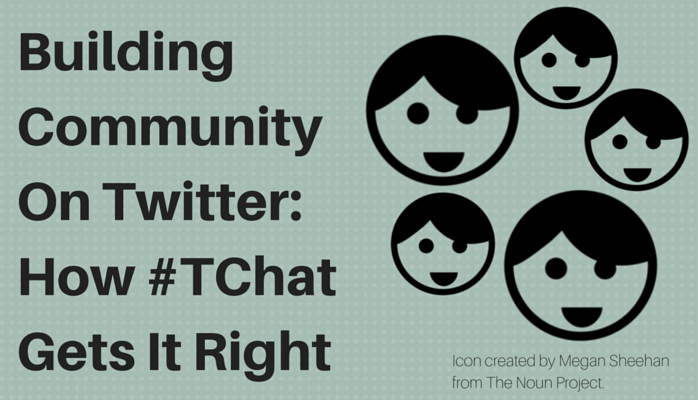
Building Community On Twitter: How #TChat Gets It Right
FeverBee defines community as "a specific group of people who have developed relationships around a strong common interest." In this definition the platform, or place, that serves as the community’s meeting point doesn’t matter. It's not even part of the equation.
Relationships are a defining characteristic of both online communities. If you’ve got a bunch of people who are following you or your brand, but they’re not building relationships with one another, then you’ve actually developed an audience. This might be an attentive audience, or an audience that likes you enough to promote your content, but its an audience nonetheless. And audiences are very different than communities. :)
Twitter is a place where many communities and audiences can take shape. Unfortunately the practice of building a community on Twitter is largely misunderstood for the practice of developing an audience. In fact, if you Google the phrase, “building a community on Twitter,” the first page of results will advise you in tried and true audience building techniques.
This week I interviewed Kevin W. Grossman on the topic of building and sustaining communities on Twitter. Kevin is the co-founder and co-host of #TChat, a thriving community of HR practitioners and enthusiasts that come together weekly to discuss new happenings and insights in the world of work on Twitter. The community is centered around a weekly chat that takes place under the #TChat hashtag, every Wednesday from 7-8pm EST. Though the topics vary weekly, this core discussion has taken place without fail, since November 2010.
There are a few different characteristics that make #TChat a community, and not an audience. The most obvious one is that members have developed relationships between one another. The same people come back each week, and they know what’s going on in each other’s lives. Members check in with each other during the week, and share photos from where they’re participating. They offer jokes, and have rituals.
The community ebbs and flows based on the schedules of members, but there are regulars in the community who have participated nearly every week since the start. Some have since taken on volunteer roles to help ensure #TChat’s success and vibrancy. Newcomers are greeted, and made to feel welcome. More established members show their support of newcomers by retweeting their thoughts, and answering their questions.
Finally, the concept of #TChat is based around the core topic of "the world of work." It’s not based around Kevin and his co-founder, Meghan M. Biro’s, personal follower counts. It’s not based around the products or services that their firms provide. They understand the community isn’t about them personally, and are happy to act as guides, facilitators, and investors in its broader success. They listen to their community members, and have experimented with the timing, content, and platform as result.
What #TChat, and other successful Twitter-based chats, prove is that communities can be sustained on the platform. The true key to unlocking the success is recognizing that the community is so much more than just a Twitter following. You have to be present in the conversations, and work to make connections between community members so they find value. You have to be consistent in your presence. And you have to recognize that, like any other form of community building, it takes a lot of hard work to create something truly transformational.
If you’re interested in learning more about building a successful community on Twitter, or about #TChat specifically, I invite you to check out my latest podcast — available from CommunityGeek, iTunes, or Stitcher. As always, comments are welcome below!
I'm Head of Training for FeverBee, a consultancy that helps organizations of all sizes build thriving online communities. I teach FeverBee's Professional Community Management Course, deliver custom workshops and training sessions, and speak every now and then at events. As you can tell by this post, I also host the FeverBee Podcast where we discuss all things related to community management. I would love to have you as a subscriber!
Executive Coach for CEOs & Leaders. GTM Strategist for Startups.
9yThis was really helpful and insightful Caty, thanks so much for sharing.